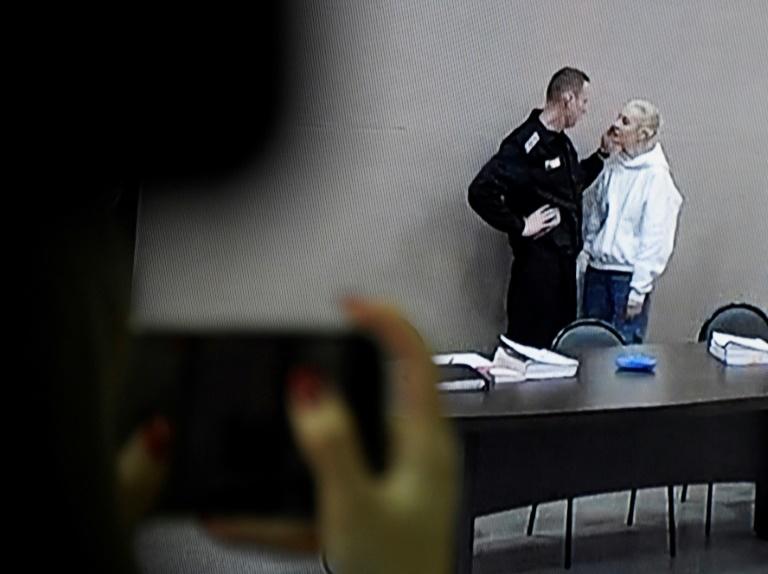
President Vladimir Putin’s main political opponent, Alexei Navalny, went on trial from inside prison on Tuesday, in a new fraud case that could see his jail time extended by more than a decade.
A video link showed Navalny dressed in prison uniform at the makeshift court inside his penal colony, smiling and embracing his wife, Yuliya Navalnaya, while guards stood either side of them.
Rights groups have criticised authorities for holding the closed-door hearing inside the maximum-security prison in Pokrov, some 100 kilometres (60 miles) east of Moscow.
Navalny said he was being tried in prison because Russian officials are “scared of what I will say.”
“I have not yet been found guilty in this case, but they keep me in uniform so a grandmother watching on television will think ‘well, he’s in prison anyway'”, he said.
Navalny’s allies decried the trial as a sham.
He has already been behind bars for a year, after surviving a poison attack that he blames on the Kremlin.
He is currently serving a two-and-a-half year sentence, but the fresh fraud charges could see his time behind bars significantly extended.
The new fraud case against Navalny was launched in December 2020, while the 45-year-old was recovering in Germany after narrowly surviving a nerve agent poisoning.
Investigators accuse Navalny of stealing for personal use more than $4.7 million in donations that were given to his political organisations. The charges carry a maximum penalty of 10 years in prison.
– Allies say timed with Ukraine crisis –
The start of the trial comes during a week of intensive talks between Russia and the West over Ukraine, with German Chancellor Olaf Scholz the latest leader due in Moscow for talks with Putin.
Navalny allies have called on Scholz to raise the fate of the politician in his talks with Putin on Tuesday.
“Germany stands for peace and justice,” his spokesperson Kira Yarmysh wrote on Twitter. “And now its stance on this is more important than ever.”
Navalny was treated by doctors in Berlin and Germany blamed his near-fatal poisoning on the Kremlin.
The country’s former chancellor, Angela Merkel, used her final visit to Moscow last year to ask Putin to free Navalny.
Maria Pevchikh, another key Navalny ally, suggested that the trial was “purposefully scheduled to coincide with the most tense week of the Ukrainian crisis.”
“They are planning to extend his sentence for another 15 years while everyone’s distracted with something bigger,” she wrote on Twitter.
Amnesty International described the hearing as a “sham trial, attended by prison guards rather than the media.”
“It’s obvious that the Russian authorities intend to ensure that Navalny doesn’t leave prison any time soon,” it said on Monday.
Navalny also faces up to six months in prison if convicted of a contempt of court charge.
Navalny’s poisoning and arrest sparked widespread condemnation abroad as well as sanctions from Western capitals.
After his arrest, Navalny’s political organisations across the country were declared “extremist” and shuttered, while many key aides fled Russia fearing prosecution.
ml-oc/jbr/jm




